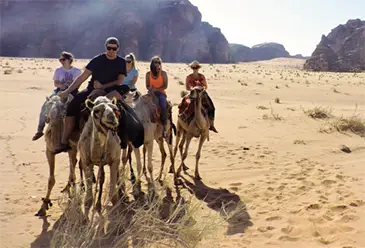Joshua Brown writes of his experience spending the summer of 2015 in Jordan which was supported by the Benjamin A. Gilman International Scholarship.

After departing the humid, temperate forests of Tennessee, I touched down in a distant land I had only studied through the accounts of others. My experiences in the country are best represented by a quote from King Hussein I who said, “Jordan has a strange, haunting beauty and a sense of timelessness. Dotted with the ruins of empires once great, it is the last resort of yesterday in the world of tomorrow.” While studying Arabic five hours a day, five days a week over nine weeks, the School for International Training (SIT) created an experience so each student could discover the country and its people. From the ruins of Petra, to the port of Aqaba, few words or pictures could illustrate the innate beauty that exists in Jordan; each face of her children bore an identity that was as ever changing as she. Because of this, SIT sought to ensure we experienced many opportunities and settings that would then reflect Jordan and her children.
Native Jordanian Bedouins, Syrian refugees, Palestinian nationalists, ex-patriots, and countless more embodied what and who it was to be “a son or daughter of the state.”
We lived with Bedouins during Ramadan, celebrated Eid with our host families, and retraced the paths of the Silk Road atop the backs of camels like those that came before us. This was my Jordan.
My Jordan was found in the dishes prepared by our Bedouin families after hours of fasting during the height of Ramadan. My Jordan came to life in the conversations with taxi drivers as we crisscrossed Amman, going from home to class to downtown then back home (all to do it again the next day). My Jordan is one that is unique to my story, and one that I hope to add to the pages of our shared College Scholars Program book that houses our lineage, past and present. Now, looking back, it’s a bit easier to see the program’s success, especially atop an eight foot, Jordanian camel.